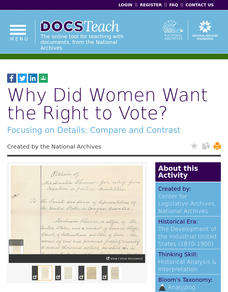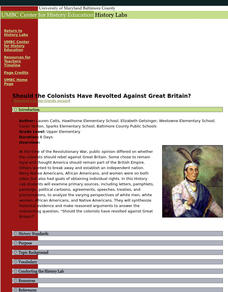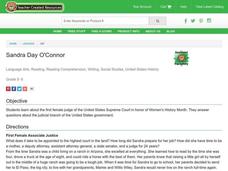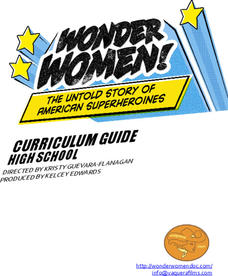Curated OER
History Quiz #15
In this history quiz #15 learning exercise, students answer 20 questions, not interactively, about history, then scroll down to check their answers.
Curated OER
Not Only Paul Revere: Other Riders of the American Revolution
Middle schoolers examine circumstances surrounding rides of the American Revolution other than Paul Revere's, explore why posterity treated them differently than Revere's ride, and create original poems based on historical fact.
Center for History Education
To What Extent Were Women's Contributions to World War II Industries Valued?
Women rose to the challenge when the nation's war effort called them—but were sent home when the GIs came back from World War II. Young historians consider whether the United States valued women's contributions during the war using a...
National Woman's History Museum
Women, Propaganda, and War
Governments rely on propaganda to build support for wars. Class members examine six propaganda posters, two each from the Spanish-American War, World War I, and World War II, and analyze how the way women were portrayed in the posters...
DocsTeach
Why Did Women Want the Right to Vote?
No taxation without representation may have been the battle cry of the American Revolution, but women used the same argument when demanding their right to vote in the late 1800 and early 1900s. Young historians examine petitions from...
Curated OER
Melba Pattillo and Ruby Bridges: Two Heroes of School Integration
Learners put themselves in the shoes of students who integrated Little Rock High School in 1957-58. Note: The primary resources in this activity provide powerful and poignant descriptions of what those students faced.
Crafting Freedom
Harriet Jabocs and Elizabeth Keckly: The Material and Emotional Realities of Childhood in Slavery
Through the journals written by Harriet Jacobs and Elizabeth Keckly, young readers gain insight into the lives of two enslaved children on nineteenth-century plantations.
Curated OER
A Critical Challenge Approach to Woman in New France and Huronia
Students works in groups to study the lives of women in New France and Huron communities. For this French and Indian history lesson, student groups research cultural attributes that existed for women in New France and Huron communities....
Curated OER
Women and the Law Ladies of the 80's: 1780's, 1880's, 1980's
Young scholars examine laws that have affected women in history: the 1780's, following the United States independence from England; the 1880's, the time of westward expansion, the silver/gold era, and the coming of the Industrial...
Curated OER
Women: Struggle and Triumph
Students perform research using primary resources in order to create a knowledge base for the place of women in society. The sources are synthesized by students to reveal the true story of the extraordinary women of America.
Center for History Education
Should the Colonists Have Revolted Against Great Britain?
Should the Americans have taken the plunge and revolted against Great Britain? Using documents, including the famed Common Sense and a Loyalist response, pupils conduct a lengthy investigation of the question. The interesting resource...
New York State Education Department
US History and Government Examination: June 2010
Just how successful were the reform movements of the ninteenth and twentieth centuries? Using documents ranging from the writings of Mother Jones to the marriage vows of Lucy Stone, individuals consider the question in a scaffolded...
City University of New York
Women's Suffrage and World War I
Democracy cannot exist where not everyone has equal rights. Discuss the state of democracy and women's suffrage during World War I with class discussions, debates, and primary source analysis, in order for class members to connect with...
US House of Representatives
Keeping the Faith: African Americans Return to Congress, 1929–1970
The third lesson in a unit that traces the history of African Americans serving in the US Congress examines the period from 1929 through 1970. After reading a contextual essay that details the few African Americans elected to Congress...
US House of Representatives
Objects in Time
Artifacts can be used to study people and events of the past. That's the takeaway from the fifth lesson plan in a unit study of African Americans who served in Congress. Groups select an artifact associated with a Black Congress Member...
Curated OER
Japanese American Baseball in the Camps
Students study Japanese American internment camps. In this American history lesson, students compare and contrast the camp internees' experiences with with team sports-related challenges students have encountered. Students discuss team...
Curated OER
Native American Gender Roles in Maryland: A Second Look
In this primary source analysis worksheet, students examine Native American history to complete the graphic organizer about gender roles in Native American societies.
Curated OER
Sandra Day O'Connor
No unit on important women in history would be complete without a activity on Sandra Day O'Connor. After reading background information about the first female Supreme Court justice, middle schoolers engage in several activities...
Crafting Freedom
Harriet Jabocs and Elizabeth Keckly: The Material and Emotional Realities of Childhood in Slavery
Learning how to make accurate inferences by putting together facts found in multiple sources is one of those skills all learners must develop, but one that can be a challenge to teach. This resource is a must-have for your curriculum...
Curated OER
Reformers versus Residents in Five Points: A Role Play
Social Studies and role-playing can go hand in hand. Learners use supporting evidence found in primary and secondary source material to develop a character from the Five Points neighborhood in the 1850s. Each student takes on the role of...
Crafting Freedom
F.E.W. Harper: Uplifted from the Shadows
What is stereotyping, and how do we handle stereotyping in our daily interactions? Your young historians will not only have the opportunity to learn about the first African American woman to publish a short story–Frances Ellen...
Vaquera Films
Wonder Women - The Untold Story of American Superheroines: High School Curriculum Guide
A 41-page curriculum guide tells the story of the untold stories of American Superheroines! Divided into three modules, the guide is designed to be used before, during, and after viewing the 2012 documentary Wonder Women! The Untold...
American Institute of Physics
When Computers Wore Skirts: Katherine Johnson, Christine Darden, and the “West Computers”
Did you know that people, known as computers, performed the complex calculations that are now done by electronic computers? Three of these human computers, Katherine Johnson, Christine Darden, and Melba Roy Mouton are featured in a...
National Woman's History Museum
Rosie the Riveter: The Embodiment of the American Woman’s Economic and Social Awakening
Critical events force change. World War II forced a change in perceptions of and attitudes toward women. When thousands of men joined the military American factories were left shorthanded. Young historians investigate how media was used...

























